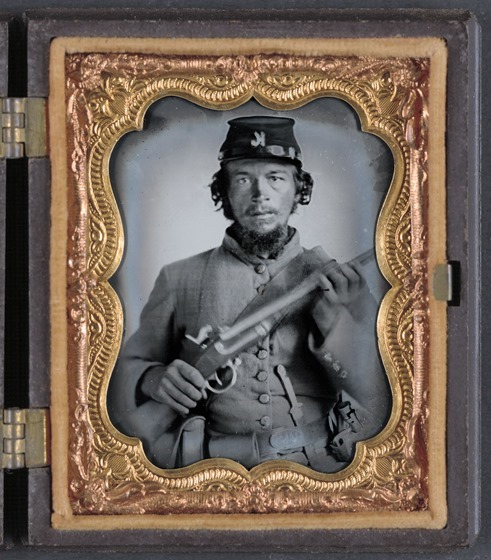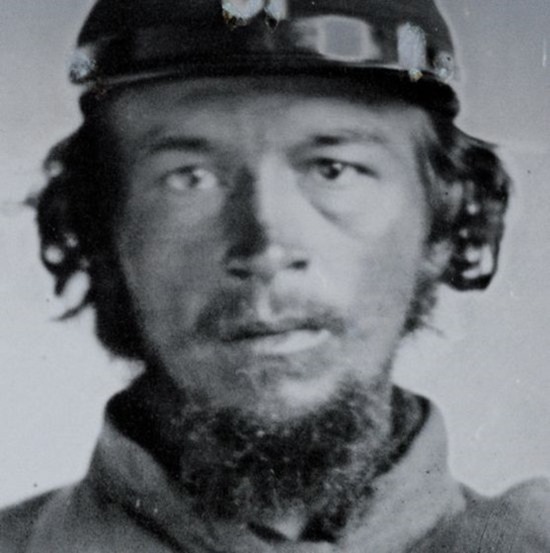December 24th. General Averill and his troops returned today after a raid of fifteen days. The boys and horses show the effects of hard service as I saw them pass through town on to Harper’s Ferry. They did an immense amount of damage to the enemy. Hard fighting, fording many streams in extreme cold weather during cold rains, and snow. A soldier’s life in the field is a very severe one. The poor horses suffer as well as the men. Orders received for the regiment to return to our camp at Martinsburg. Christmas Eve.
December 2013
En route, Thursday, Dec. 24. Lay waiting for orders to move till 10 A. M., when it came—”to strike tents” and march out. Marched through town which was once an active place from appearances. Followed the Nashville road for one mile then turned east through a low swampy bottom, and o(?) course progressed very slowly through mud holes and over corduroys, having to halt frequently to allow trains to close up. Made coffee. Camped at 4 P. M. Pitched our tents at will in a thicket of oak and pine on a side hill. Rails plenty out of which we made large fires and gathered large piles of leaves for “downy beds.” The evening was calm and still, the thick growth above giving our camp a picturesque appearance like a mammoth hall. It was Christmas eve, and many were the loving wishes that “we were home”. Game of cards whiled away the hours pleasantly to many. I was suffering with a severe toothache. The very thing to relieve it—lay down early and contrasted past scenes with present, trying to pry into the future, until weary nature lulled pain and homesickness, and I slept to dream of home.
Unidentified soldier in uniform and Company K hat with musket; Confederate or Union.
__________
Close-up crop:
__________
ninth-plate tintype, hand-colored ; 8.6 x 6.5 cm (case)
Liljenquist Family Collection of Civil War Photographs; Ambrotype/Tintype photograph filing series; Library of Congress Prints and Photographs Division.
Record page for image is here.
__________
 Note – This image has been digitally adjusted for one or more of the following:
Note – This image has been digitally adjusted for one or more of the following:
- fade correction,
- color, contrast, and/or saturation enhancement
- selected spot and/or scratch removal
- cropped for composition and/or to accentuate subject matter
- straighten image
Civil War Portrait 108
by John Beauchamp Jones
DECEMBER 24TH.—Another interposition of Providence in behalf of my family. The bookseller who purchased the edition of the first volume of my “Wild Western Scenes—new series,” since Mr. Malsby’s departure from the country, paid me $300 to-day, copyright, and promises more very soon. I immediately bought a load of coal, $31.50, and a half cord of wood for $19. I must now secure some food for next month.
Among the papers sent in by the President, to-day, was one from Gen. Whiting, who, from information received by him, believes there will be an attack on Wilmington before long, and asks reinforcements.
One from Gen. Beauregard, intimating that he cannot spare any of his troops for the West, or for North Carolina. The President notes on this, however, that the troops may be sent where they may seem to be actually needed.
Also an application to permit one of Gen. Sterling Price’s sons to visit the Confederate States, which the President is not disposed to grant.
The lower house of Congress yesterday passed a bill putting into the army all who have hitherto kept out of it by employing substitutes. I think the Senate will also pass it. There is great consternation among the speculators.
December 24.—Yesterday a foraging party was sent out from the Union camp at Tullahoma, Tenn., under the command of Lieutenant Porter, of the Twenty-seventh Indiana volunteer infantry. There was a guard of the Fourth Tennessee cavalry, and a detail from the battery, to guard and load forage. They went to Lincoln County, loaded up, and were on the way to camp for the night. The train was divided—one half under Sergeant James, of the battery, was in camp about one mile ahead; Lieutenant Porter, with the rear part of the train, was on his way to the same place. There was one wagon considerably ahead of the others, accompanied by George Jacobs, driver; John Wesley Drought and Newell Orcutt, foragers; and James W. Foley, battery wagon-master—when they were surprised by four guerrillas, and told to surrender or they would blow their brains out. They being unarmed, could make no successful resistance. Lieutenant Porter then came riding up, when he was seized also. They were then taken through the woods some eight miles, and halted to camp, as the guerrillas said, for the night They then tied their hands behind their backs, asked if they were ready, and fired, when all fell except the Lieutenant, who being uninjured, ran. The bodies were then dragged to the end of the bluff and thrown into Elk River. Drought was killed instantly. His body floated down and lodged on a tree-top. Jacobs was only wounded in the arm and was drowned. Orcutt was shot through the bowels, and managed to get out of the river, but died next day. Foley having loosed his hands, reached shore, but being severely wounded in the groin, lay near the river all night, where he was found next day by a citizen and properly cared for.—The schooner Fox captured the British schooner Edward, from Havana, off the Suwanee River, while endeavoring to run the blockade.—The United States steamer Sunflower, off Tampa Bay, Florida, captured the rebel sloop Hancock.
—A battle took place near Bolivar, Tenn., between a party of rebel raiders belonging to the command of General Forrest, and five hundred of the Seventh Illinois cavalry, under Colonel Edward Prince, who had been sent out to scout and patrol the crossings on the Mississippi Central Railroad. Finding himself overpowered by numbers, Colonel Prince fell back on Summerville, with a loss of three killed and eight wounded. (Doc. 50.)
—The rebel House of Representatives, by a vote of four to one, resolved that a “person otherwise liable to military duty shall no longer be exempt by reason of having provided a substitute. It declared also that the substitute should not be discharged, and rejected a proposition to refund to the principal any portion of the money paid for his substitute.”—The enlistment of colored troops at Nashville, Tenn., continued with great success.—The ship Martaban, from Moulmein to Singapore, was captured and destroyed by the rebel privateer Alabama.
December 23, Wednesday. Congress has adjourned to the 5th of January. Little has been done as yet. There appears to be, I think, a good feeling among the Members, though there are petty intrigues among the small men in abundance.
24th. At 1:30 orders came to move immediately to the Chuckey for the purpose of capturing a rebel brigade. Campbell’s brigade to attack in front and Garrard the rear, Garrard to have command. Col. Palmer, senior, of G.’s, had detachments from 11th Ohio, 75th Penn., 1st Tenn. When half a mile from road, rebels fired on our pickets and Palmer rushed out, bringing on an engagement. Rebels charged nearly to our horses, then we charged them for half a mile. Ordered back by Sturgess just as were making a flank movement. Rather heavy loss on each side. Saw Bennie Sears. Things looked rather scaly for awhile. Got out all right. In camp at 10 P. M. Supper.
23rd. Hillhouse came around early. Hurried breakfast and wrote a few lines home and to Fannie, for Thede to take. Got George a saddle and Lewis govt. horse. How I dislike to have Thede leave me. I shall be homesick. Still it is best. Poor fellow. God grant he may get well soon. Command moved at 9 A. M. following Woolford’s division. I waited till near dark. Lu (Emmons) and I went together. Awful ford over Holston. Found brigade at Newmarket. Took supper with Maj. Nettleton. Slept on floor.
Wednesday. 23d—The weather continues quite pleasant. There is no news. All is quiet here. There has been no foraging for two months now, for the reason that there is nothing left to forage. I often wonder what the farmers in this section live on; whatever they have certainly cannot be in abundance. The citizens of Vicksburg are a little more fortunate; that is, if they have the greenbacks, for since July 4th, last. Confederate scrip is no longer legal tender. Some people still have a little gold and silver, which comes from its hiding place when their larders run low.
December 23 — Very cold last night and to-day. Nearly the whole company was busily engaged in building houses for winter quarters. Each mess puts up its own domicile. However, I am building one of my own without a chimney, as I have sworn off from the chimney-building business for this winter; I will be a boarder with my mess, but I furnish my own lodging.











